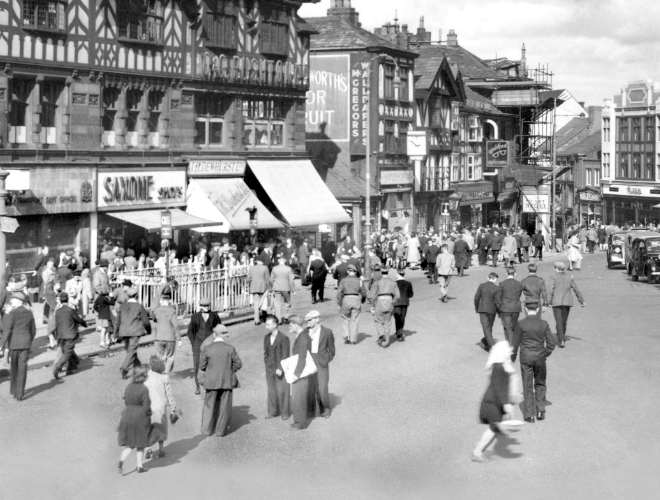Pub history
The Moon Under Water
Learn about the meaning behind this pub’s name.

The writer George Orwell imagined his ideal pub and described it in a newspaper article. He called it ‘Moon Under Water’ – which is why several Wetherspoon pubs have that name. This one occupies 5–7a Market Place. Number 5 is a former a bank which opened in 1890 and closed in 1957. It then became a shoe shop. Number 7 was built in the 1960s on the site of the long-standing Cross Keys Hotel.
Text about the history of The Moon Under Water

The text reads: As well as the famous, or infamous, The Road to Wigan Pier, George Orwell is the author of the highly influential novels Animal Farm and 1984.
He also wrote a host of other novels, penetrating essays and many articles. In an article first published in 1946, Orwell reflected on his ideal pub. He chose the name The Moon Under Water.
It was to have a convenient location. After that, “if you are asked why you favour a particular public house, it would seem natural to put the beer first, but the thing that most appeals to me about The Moon Under Water is what people call its atmosphere.
“To begin with, its whole architecture (with its grained woodwork and fittings) is uncompromisingly Victorian … it has plenty of elbow room … and it is always quiet enough to talk” (in the absence of loud music). “You can get food and wash it down with a variety of different beverages, including those of a non-alcoholic variety.
“The Moon Under Water is my ideal of what a pub should be.” J D Wetherspoon thinks so too.
Above: George Orwell
Text about The Road to Wigan Pier

The text reads: This famous book was written by George Orwell in 1936. It is a picture of working-class life in the depths of the Depression, commissioned by the publisher Victor Gollancz.
Orwell spent several weeks researching his book, lodging at 72 Warrington Lane. This was the home of John and Lily Anderton, which was in a typical poor street of terraced houses – three rooms up and two down, cold tap only and an outside lavatory. After a week, he moved to rooms above a tripe shop at 22 Darlington Road.
Orwell made systematic notes on housing conditions and wages. He spent several days in the public library (his name is in the register as Eric Blair), consulting reports on public health and conditions in the mines.
He also listened to and enthusiastically took part in innumerable political discussions.
The Road to Wigan Pier has since made the town famous throughout the world. It was a picture which haunted Wigan for many years and has been criticised locally for presenting a selective view.
Above: George Orwell
Photographs, an illustration and text about pit-brow lasses

The text reads: From the beginning of organised coal-mining in Britain, nearly a thousand years ago, women and girls worked alongside men and boys. The traditional female role in mining was to drag baskets of coal along roadways, until an 1842 report describing working practices in the mining industry shocked the public.
Women and girls were banned from working underground. Many women lost their livelihood as a result. Some disguised themselves as men, discarding their petticoats. Years later, this style of dress, particularly around Wigan, was the norm, when women were working exclusively on the surface.
Hard times and hard work made for a formidable and united female work force. During the miners’ strike of 1984, the Lancashire Women Against Pit Closures movement showed that the spirit of the pit brow lasses was still alive.
Photographs and text about entertainment in Wigan

The text reads: Wigan Casino first opened as a dance hall called the Empress Ballroom, but it became world-famous between 1973 and 1981 after local DJ Ross Winstanley and Wigan Casino manager Mike Walker were given the go-ahead to run all-nighters.
Wigan Casino became a Mecca for youngsters who wanted to hear the latest northern soul artists and to dance. In 1978, the American music magazine Billboard voted Wigan Casino ‘The Best Disco in the World’.
The building was gutted by fire in 1982 and demolished the following year. The site later became the Grand Arcade shopping centre.
The Verve were one of the most important alternative rock groups in Britain during the 1990s. The original lineup, led by singer Richard Ashcroft, met at Winstanley College in 1989.
In 1997, their Urban Hymns became one of the best-selling albums in UK chart history, and their single Bitter Sweet Symphony became a worldwide hit. The band were voted Best British Group in 1998.
The Verve broke up in April 1999, citing internal conflicts. The band’s original lineup reunited in June 2007, only to break up again in 2009.
Prints, an illustration and text about the Leeds–Liverpool Canal

The text reads: In 1770, an Act of Parliament authorised the construction of a canal from Leeds to Liverpool. The opening of the country’s longest single canal brought enormous economic benefits for local industry. The bulk transportation of vital raw material, such as coal and cotton, cut costs dramatically.
The initial survey was carried out by James Brindley, the pioneer canal builder. The first section in Lancashire, between Liverpool and Leigh, was completed in 1777. By 1795, Leigh had been joined to the Bridgwater Canal, and in 1819, the two canal systems were joined by a cut from Wigan to Leigh. The terminus was at the building now known as No. 1 Wigan Pier.
As well as transporting bulk cargoes, the canal basin was used for pleasure cruises. Packet boats would leave Wigan daily in the summer months for trips to Liverpool and Manchester.
Today, the day trips have been replaced by waterbus services, which operate around the recently restored pier complex, linking the site with Trencherfield Mill. There is also a heritage centre and the Way We Were, a lively recreation of local life at the turn of the 20th century.
Top, left: James Brindley, the first great canal engineer
Bottom, left: The Duke of Bridgwater, who commissioned Brindley to build the first canal, which bore the Duke’s name
Top, right: Wigan Pier being demolished
Bottom, right: Pleasure Steamer SS Thomas leaving Wigan
A photograph of the arrival of HRH The Duke of Gloucester, Wigan Pier, c1939

External photograph of the building – main entrance




